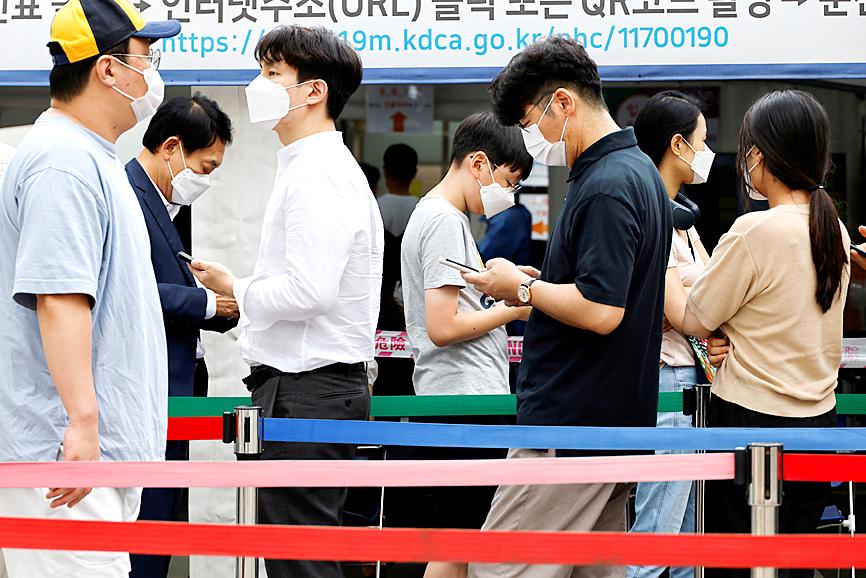South Korea is raising social distancing in Seoul to its highest level, banning gatherings of three or more people after 6pm and ordering nighttime entertainment businesses to close, as the capital is at the center of a surge in COVID-19 cases.
The nation is moving social distancing regulations to the level of 4 for Seoul, where the majority of new cases have emerged, with sporadic outbreaks at restaurants, bars and shopping malls.
The latest surge is a setback for a nation that has been lauded as a model for containing the pandemic without imposing a lockdown.

Photo: Reuters
The measures to be imposed for Seoul would be the strictest since the South Korean government restricted businesses in Daegu after an outbreak at a mega church early last year, which led to the nation’s first major surge in cases.
The measures are to take effect on Monday next week and last for two weeks, South Korean Prime Minister Kim Boo-kyum said in a televised address.
Seoul has posted record numbers of cases in the past two days after the nation eased social distancing regulations, which have since been rescinded.
After a slow start amid a supply shortage, South Korea has stepped up vaccinations and has inoculated about 30 percent of the population with at least one dose.
About 11 percent of the population have been fully vaccinated.
South Korea yesterday reported 1,316 new cases, a record high.

VAGUE: The criteria of the amnesty remain unclear, but it would cover political violence from 1999 to today, and those convicted of murder or drug trafficking would not qualify Venezuelan Acting President Delcy Rodriguez on Friday announced an amnesty bill that could lead to the release of hundreds of prisoners, including opposition leaders, journalists and human rights activists detained for political reasons. The measure had long been sought by the US-backed opposition. It is the latest concession Rodriguez has made since taking the reins of the country on Jan. 3 after the brazen seizure of then-Venezuelan president Nicolas Maduro. Rodriguez told a gathering of justices, magistrates, ministers, military brass and other government leaders that the ruling party-controlled Venezuelan National Assembly would take up the bill with urgency. Rodriguez also announced the shutdown

Civil society leaders and members of a left-wing coalition yesterday filed impeachment complaints against Philippine Vice President Sara Duterte, restarting a process sidelined by the Supreme Court last year. Both cases accuse Duterte of misusing public funds during her term as education secretary, while one revives allegations that she threatened to assassinate former ally Philippine President Ferdinand Marcos Jr. The filings come on the same day that a committee in the House of Representatives was to begin hearings into impeachment complaints against Marcos, accused of corruption tied to a spiraling scandal over bogus flood control projects. Under the constitution, an impeachment by the

Exiled Tibetans began a unique global election yesterday for a government representing a homeland many have never seen, as part of a democratic exercise voters say carries great weight. From red-robed Buddhist monks in the snowy Himalayas, to political exiles in megacities across South Asia, to refugees in Australia, Europe and North America, voting takes place in 27 countries — but not China. “Elections ... show that the struggle for Tibet’s freedom and independence continues from generation to generation,” said candidate Gyaltsen Chokye, 33, who is based in the Indian hill-town of Dharamsala, headquarters of the government-in-exile, the Central Tibetan Administration (CTA). It

A Virginia man having an affair with the family’s Brazilian au pair on Monday was found guilty of murdering his wife and another man that prosecutors say was lured to the house as a fall guy. Brendan Banfield, a former Internal Revenue Service law enforcement officer, told police he came across Joseph Ryan attacking his wife, Christine Banfield, with a knife on the morning of Feb. 24, 2023. He shot Ryan and then Juliana Magalhaes, the au pair, shot him, too, but officials argued in court that the story was too good to be true, telling jurors that Brendan Banfield set